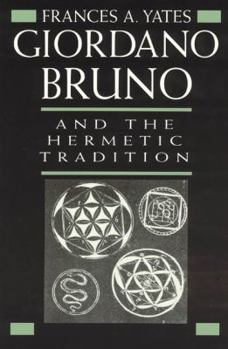Giordano Bruno and the Hermetic Tradition
Select Format
Select Condition 
Book Overview
Placing Bruno--both advanced philosopher and magician burned at the stake--in the Hermetic tradition, Yates's acclaimed study gives an overview not only of Renaissance humanism but of its interplay--and conflict--with magic and occult practices. "Among those who have explored the intellectual world of the sixteenth century no one in England can rival Miss Yates. Wherever she looks, she illuminates. Now she has looked on Bruno. This brilliant...
Format:Paperback
Language:English
ISBN:0226950077
ISBN13:9780226950075
Release Date:February 1991
Publisher:University of Chicago Press
Length:480 Pages
Weight:1.45 lbs.
Dimensions:0.9" x 6.0" x 9.0"
Customer Reviews
4 ratings
Worthwhile read
Published by Thriftbooks.com User , 15 years ago
In this book, Frances Yates set out to discuss the background of the Bruno heresy procedings, and explain them in terms of the view of hermeticism prevalent in the 16th century. She does this admirably. However, in addition, she succeeds in providing a great survey of hermetic thought in general in the 16th century. This work thus becomes extremely useful in understanding the 16th century world-view, politics, religious thought, perhaps moreso than its main thesis. Well recommended.
a masterpiece, definitely
Published by Thriftbooks.com User , 15 years ago
Today's science originated in the renaissance as part of a curiously retro movement devoted to resurrecting old Latin and Greek texts and ideas. When Corpus Hermeticum, a compilation of neoplatonist and gnostic texts arrived from Byzantium to the Medici court, old Cosimo was on his deathbed yet had it translated so he could read it right away. Here is an excerpt: "Unless you make yourself equal to God, you cannot understand God: for the like is not intelligible save to the like. ..... Draw into yourself all sensations of everything created, fire and water, dry and moist, imagining that you are everywhere, on earth, in the sea, in the sky, that you are not yet born, in the maternal womb, adolescent, old, dead, beyond death. If you embrace in your thought all things at once, times, places, substances, qualities, quantities, you may understand God." Yates uses CH as a wedge with which to illuminate a great battle fought at the end of the 16th century between the Vatican's military-political machine and its "freedom-loving" opponents. The CH texts (XI of them) were seized upon by a motley group of philosophers, cabalists, alchemists and magicians across Europe including Pico della Mirandola, Cornelius Agrippa, Giordano Bruno, Robert Fludd and Marsilio Ficino as well as the future Borgia pope, Alexander VI. It just so happens that many of these 'magicians' also represented the first promoters and practitioners of the black empirical art that we today call science. Interest in CH was denounced both by conservative Catholics, who immediately recognized esoteric-hermeneutic competition when they saw it and by rationalists like Erasmus who were unable to follow the hermetist's imagination. The first half of Yates' book barely mentions Bruno as it lays out the context and describes the protagonists of pro-, non- and anti-Catholic versions of European hermeticism. Here she seems to champion a new, brave and unorthodox view that stresses the implications of hermetic tradition for Western philosophy, politics and science. Once you think about it, it makes perfect sense. I always wondered about the occult & pseudo Egyptian symbols that one sees painted on the chamber walls of Vatican's residences. Yates explains the Church was not opposed to 'magic' as long as the 'magicians' recognized the primacy of Christian ideas and beliefs. Which Ficino and della Mirandola were happy to do; Agrippa paid it lip service - while Bruno denounced it loudly and clearly. Bruno's sin for which he paid with his flesh had little to do with science or cosmology. According to Yates his situation was completely different from Galileo's. The man was not burned for having championed a competing view of the solar system. Rather, Bruno was first betrayed (by a rich Venetian merchant who invited him for a visit) and sentenced to death for having revised basic tenets of hermeticism into a new kind of magic which excluded Christian dogma and symbolism. Bruno, an ex-dominican friar
A treasure trove of insight into the western esotericism
Published by Thriftbooks.com User , 24 years ago
Interesting how a modest historian should happen to write a book of such critical interest to students and practicioners of the western esoteric traditions. Sheds enourmously penetrating light, especially in the first part of the book, into the people and historical events that shaped the powerful undergound traditions of independent spiritual philosophy-- what we now know as Magick or Magic, both high and low, alchemy, illuminisms of various sorts, and the whole spectrum of western metaphysics.
Brilliant, scholarly introduction to Renaisssance magic
Published by Thriftbooks.com User , 25 years ago
This is Yates's masterpiece, a brilliant and lucid survey of a wide range of magical traditions in the Renaissance. Yates argues that magic lay at the heart of the Scientific Revolution of the seventeenth century, and places the extraordinary misfit Giordano Bruno (1548-1600) at the center of that development. In later works, Yates often let her insight run wild, but this book rightly revolutionized thinking about magic and occultism in the Renaissance. It will be a difficult read for those not used to academic writing, but it is extremely clear, and well worth the effort.




